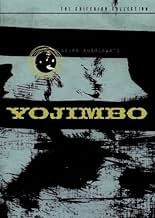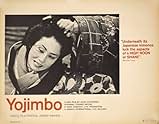In un piccolo villaggio due fazioni si combattono da lungo tempo. Un giorno giunge nel villaggio un samurai che, saputa la situazione, decide di offrire i suoi servigi ad una delle due parti... Leggi tuttoIn un piccolo villaggio due fazioni si combattono da lungo tempo. Un giorno giunge nel villaggio un samurai che, saputa la situazione, decide di offrire i suoi servigi ad una delle due parti.In un piccolo villaggio due fazioni si combattono da lungo tempo. Un giorno giunge nel villaggio un samurai che, saputa la situazione, decide di offrire i suoi servigi ad una delle due parti.
- Candidato a 1 Oscar
- 5 vittorie e 2 candidature totali
Recensione in evidenza
YOJIMBO is an action drama about a rōnin who finds himself at the center of a conflict between the two crime lords.
A hungry and tired rōnin wanders through a desolate Japanese countryside. Soon, he arrives in a small town. A local caterer advises him to leave because, two local clans fight every day on the streets. However, a stranger decides to stay. The situation in a town is very good for one rōnin. This is a good chance that he earns some money. However, he does not need a bloody money. He wants to destroy local crime lords...
This tense story is full of lies, doubt, turning, pranks, blackmails and excellent fights. A careless and seemingly insensitive samurai is actually a peaceful and good man. Mr. Kurosawa has, under the influence of a western and noir, made a very exciting and visually impressive film. Of course, he has not neglected the significant situations that are related to the Japanese culture and tradition.
Close-ups, almost perfectly, reflect an evil, arrogance, fear, invincibility and contempt on faces of some of the protagonists. There is a large number of villains, which are quite different in character.
Toshiro Mifune (Kuwabatake Sanjuro) is a resourceful, interesting and determined as a wandering rōnin and master swordsman. He, apparently, enjoys in his machinations, however, his goal is extremely benevolent. He's kind of a lone hero, regardless of a tactical evil and theatrical swagger in his character.
His support are Tatsuya Nakadai as Unosuke a wild and insolent gunslinger and the biggest threat to a samurai. He is interesting because he is a completely different character from Sanjuro. Kyū Sazanka (Ushitora) and Seizaburo Kawazu (Seibei) are fairly inconclusive as crime lords. However their primary relationship "of a teacher and his student", could be interesting. Isuzu Yamada as Orin is the the wife of Seibei. She is perhaps an initiator of conflicts. Daisuke Katō as Inokichi is a visually the most memorable character. A character, who is capable to commit a vicious murder, but also make the greatest stupidity.
Simply, Mr. Kurosawa has managed to combine several styles in a small masterpiece.
A hungry and tired rōnin wanders through a desolate Japanese countryside. Soon, he arrives in a small town. A local caterer advises him to leave because, two local clans fight every day on the streets. However, a stranger decides to stay. The situation in a town is very good for one rōnin. This is a good chance that he earns some money. However, he does not need a bloody money. He wants to destroy local crime lords...
This tense story is full of lies, doubt, turning, pranks, blackmails and excellent fights. A careless and seemingly insensitive samurai is actually a peaceful and good man. Mr. Kurosawa has, under the influence of a western and noir, made a very exciting and visually impressive film. Of course, he has not neglected the significant situations that are related to the Japanese culture and tradition.
Close-ups, almost perfectly, reflect an evil, arrogance, fear, invincibility and contempt on faces of some of the protagonists. There is a large number of villains, which are quite different in character.
Toshiro Mifune (Kuwabatake Sanjuro) is a resourceful, interesting and determined as a wandering rōnin and master swordsman. He, apparently, enjoys in his machinations, however, his goal is extremely benevolent. He's kind of a lone hero, regardless of a tactical evil and theatrical swagger in his character.
His support are Tatsuya Nakadai as Unosuke a wild and insolent gunslinger and the biggest threat to a samurai. He is interesting because he is a completely different character from Sanjuro. Kyū Sazanka (Ushitora) and Seizaburo Kawazu (Seibei) are fairly inconclusive as crime lords. However their primary relationship "of a teacher and his student", could be interesting. Isuzu Yamada as Orin is the the wife of Seibei. She is perhaps an initiator of conflicts. Daisuke Katō as Inokichi is a visually the most memorable character. A character, who is capable to commit a vicious murder, but also make the greatest stupidity.
Simply, Mr. Kurosawa has managed to combine several styles in a small masterpiece.
- elvircorhodzic
- 12 apr 2017
- Permalink
Trama
Lo sapevi?
- QuizAkira Kurosawa told Toshirô Mifune that his character was like a wolf or a dog and told Tatsuya Nakadai that his character was like a snake. Inspired by this direction, Mifune came up with Sanjuro's trademark shoulder twitch, similar to the way a dog or wolf tries to get off fleas.
- BlooperIn the initial fight scene, The Samurai cuts the first two adversaries in the mid-section, then slices the last man's arm off. That last man is first seen from behind holding the sword in his right arm above his head, but the arm holding the sword shown moments later is a left arm.
- Versioni alternativeThe initial US release ran only 75 minutes, 35 minutes shorter than the original version at 110 minutes.
- ConnessioniFeatured in 62nd Annual Academy Awards (1990)
I più visti
Accedi per valutare e creare un elenco di titoli salvati per ottenere consigli personalizzati
Dettagli
Botteghino
- Lordo Stati Uniti e Canada
- 46.808 USD
- Fine settimana di apertura Stati Uniti e Canada
- 15.942 USD
- 28 lug 2002
- Lordo in tutto il mondo
- 68.196 USD
- Tempo di esecuzione1 ora 50 minuti
- Colore
- Proporzioni
- 2.35 : 1
Contribuisci a questa pagina
Suggerisci una modifica o aggiungi i contenuti mancanti

Divario superiore
By what name was La sfida del samurai (1961) officially released in India in Hindi?
Rispondi


































